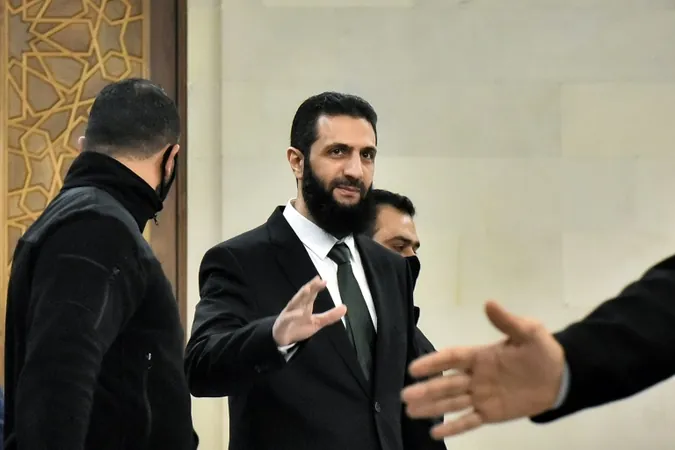
Syria's New Leader Ahmed al-Sharaa Declares War on Unregulated Weapons in the Nation!
2024-12-22
Author: Ting
Introduction
In a significant shift in power dynamics within Syria, newly appointed leader Ahmed al-Sharaa has made bold declarations regarding the control of weapons in the country. Just two weeks after his Islamist faction Hayat Tahrir al-Sham (HTS) orchestrated a takeover of Damascus, Sharaa stated that all arms, including those in the possession of Kurdish-led forces, will fall under the authority of the state. This announcement comes in the wake of a sweeping military offensive that has dramatically altered the political landscape.
Press Conference Highlights
During a press conference held with Turkish Foreign Minister Hakan Fidan, Sharaa emphasized, "We will absolutely not allow there to be weapons in the country outside state control," as he addressed burgeoning issues related to various armed groups. He mentioned that armed factions would be dissolved and integrated into the official army, a decision expected to facilitate greater national unity and reduce conflict.
Regional Influences and International Dialogue
The backdrop of this powerful transition in leadership reveals the complexities of regional influences at play, with Ankara-backed rebels having a pivotal role in supporting HTS during the offensive that resulted in the ousting of the long-standing ruler Bashar al-Assad. Seeking to mend relations, both local and international leaders have engaged in dialogue, hoping for stabilization in a nation still scarred by nearly 14 years of civil war.
Commitment to Protect Minorities
As Sharaa affirmed his commitment to protect minorities and prevent sectarian strife, he also highlighted the need for a unified Syrian identity, stating, "Syria is a country for all and we can coexist together." This sentiment was echoed in the festive atmosphere at a Christmas market in Damascus, illustrating the enduring spirit of cultural coexistence among citizens despite the ongoing tumult.
Turkey's Role and Economic Revitalization Efforts
Interestingly, Turkey's calls to lift sanctions on Syria signal an interest in revitalizing the country’s economy and aiding the millions displaced by the conflict, with many seeking refuge in neighboring countries like Turkey itself.
Tensions in Kurdish-Dominated Areas
Meanwhile, the situation in the Kurdish-dominated areas, particularly the region around Kobane, remains tense. Reports from the Syrian Observatory for Human Rights indicate deadly clashes and civilian casualties, emphasizing the fragility of peace amid rising tensions between Turkish-backed factions and the Syrian Democratic Forces (SDF).
International Engagement and Extremist Challenges
International engagement has also ramped up, with diplomats from various nations, including Germany, seeking to mediate rising tensions and ensure the protection of vulnerable communities. Meanwhile, concerns about the increasing influence of extremist groups pose a challenge, as global powers push for assurances of compliance regarding women's rights and minority protections within the new regime.
Conclusion
With the specter of Assad's regime a recent memory, the newly formed government faces skepticism on the world stage. The situation remains fluid, and as the geopolitical landscape continues to shift, both regional and global powers are watching closely, navigating the complexities that define modern-day Syria.
Will Ahmed al-Sharaa maintain control, or will the remnants of past regimes and ongoing conflicts thwart his ambitions for a unified Syria? Only time will tell in this unfolding narrative of power, conflict, and the quest for stability.



 Brasil (PT)
Brasil (PT)
 Canada (EN)
Canada (EN)
 Chile (ES)
Chile (ES)
 España (ES)
España (ES)
 France (FR)
France (FR)
 Hong Kong (EN)
Hong Kong (EN)
 Italia (IT)
Italia (IT)
 日本 (JA)
日本 (JA)
 Magyarország (HU)
Magyarország (HU)
 Norge (NO)
Norge (NO)
 Polska (PL)
Polska (PL)
 Schweiz (DE)
Schweiz (DE)
 Singapore (EN)
Singapore (EN)
 Sverige (SV)
Sverige (SV)
 Suomi (FI)
Suomi (FI)
 Türkiye (TR)
Türkiye (TR)